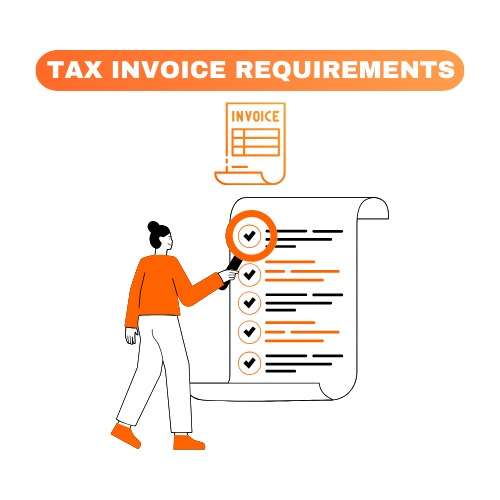Ever wondered why the fine print matters so much? When it comes to business transactions, the devil is truly in the details. The cornerstone of these details lies in understanding and adhering to tax invoice requirements. This seemingly mundane paperwork is a vital element in any business’s financial dealings. Tax invoices not only serve as proof of purchase but also play a critical role in tax compliance and financial reporting. They are essential for both businesses and customers, providing clarity, legality, and transparency in financial transactions. Delving into the realm of tax invoice requirements, we uncover the importance of accuracy, legality, and the shift to the digital age.
Essential Elements of a Tax Invoice

Key Components for Validity
Meeting tax invoice requirements is crucial for the validity of these financial documents. A valid tax invoice must include specific components: a date of issue, a unique identification number, supplier’s and customer’s details, a clear description of goods or services provided, and the tax amount both as a rate and in absolute terms. Each component plays a pivotal role in ensuring the invoice’s legality and clarity, providing a transparent record of the transaction for both parties involved. Omitting any of these components can lead to confusion and potentially legal issues.
Avoiding Ambiguity in Descriptions
To comply with tax invoice requirements, the description of goods or services on a tax invoice must be clear and specific. Vague descriptions can lead to misunderstandings and disputes. For instance, rather than just listing “consultation services,” specify the nature of the service, like “legal consultation for contract review.” This level of detail not only helps in clarifying the transaction but also assists in cases of audits or reviews by tax authorities.
Electronic Tax Invoices: Adapting to the Digital Age
Benefits and Challenges
The shift to electronic tax invoices offers significant benefits, including ease of storage, retrieval, and overall management. However, this digital transition comes with its challenges, primarily related to ensuring the security and authenticity of these documents. Businesses must navigate these changes carefully, adopting robust security measures to protect against fraud and data breaches.
Ensuring Security in the Digital Realm
To ensure the security of electronic tax invoices and to meet the evolving tax invoice requirements in the digital age, several measures are crucial. The use of digital signatures and encryption can safeguard the integrity of the document. Implementing secure systems for sending and storing these invoices also plays a critical role in preventing unauthorized access and manipulation. It’s imperative for businesses to invest in reliable and secure digital solutions when managing electronic tax invoices.
Common Mistakes and Compliance Tips
Top Mistakes to Avoid:
- Omitting Essential Information: Always include all necessary details like the date of issue, unique identification number, supplier’s and customer’s details, a detailed description of goods or services, and the tax amount.
- Incorrect Calculations: Double-check all calculations, especially the tax amount, to ensure accuracy. Mistakes here can lead to legal issues and financial losses.
- Vague Descriptions: Be specific and clear in describing goods or services. Vague descriptions can lead to misunderstandings and disputes.
- Failure to Update Information: Ensure that all information, especially tax rates and legal requirements, is up-to-date to avoid compliance issues.
- Neglecting Security for Electronic Invoices: If issuing electronic invoices, ensure they are protected with digital signatures and encryption to prevent fraud and data breaches.
- Ignoring Legal Changes: Stay informed about changes in tax laws and regulations to ensure your invoices remain compliant.
- Lack of Standardization: Implement standardized templates to maintain consistency and reduce the likelihood of errors.
- Insufficient Training: Regularly train staff on the importance of accurate invoicing and compliance to minimize mistakes.
- Not Conducting Regular Audits: Periodically audit issued invoices to catch and correct any errors and ensure ongoing compliance.
- Ignoring Professional Advice: When in doubt, consult with tax professionals or legal advisors to ensure your tax invoices meet all necessary requirements.
Best Practices for Accuracy
To ensure accuracy and compliance, businesses should adopt best practices such as using standardized templates, training staff on the importance of accurate invoicing and conducting regular audits of issued invoices. These practices help maintain consistency and reduce the likelihood of errors, ensuring that each tax invoice adheres to the required standards.
Legal Consequences of Non-Compliance
Immediate Financial Implications
Non-compliance with tax invoice requirements can lead to immediate financial implications, such as hefty fines and penalties. These financial burdens can significantly impact a business’s profitability and cash flow. Understanding and adhering to tax invoice regulations is crucial to avoiding these costly consequences.
Long-Term Reputational Damage
Beyond financial penalties, non-compliance can lead to severe reputational damage. A business known for tax-related discrepancies may lose the trust of its customers, suppliers, and partners. This loss of credibility can have lasting effects on business relationships and future opportunities. Maintaining a reputation for integrity and compliance is essential in the business world.
Conclusion:
Tax invoice requirements are more than just bureaucratic formalities; they are integral to the financial integrity of any business. Adhering to these requirements ensures legality, aids in accurate financial tracking, and builds trust with clients and tax authorities. In the era of digital transactions, understanding and implementing these requirements have become even more crucial.
As we embrace the digital age, are we prepared to navigate the intricacies of electronic tax invoicing while upholding the required standards? What steps is your business taking to adapt to and comply with these evolving requirements?
FAQs
1. What are the basic requirements for a tax invoice?
A valid tax invoice must include the date of issue, a unique invoice number, the supplier’s and customer’s details (name, address, and tax identification), a clear description of goods or services, quantity, total amount payable, and the tax amount both as a rate and in absolute terms.
2. Are electronic tax invoices legally valid?
Yes, electronic tax invoices are legally valid and increasingly common. However, they must meet the same requirements as paper invoices and should be securely stored and protected against unauthorized access or alterations.
3. How important is it to provide a detailed description of goods or services in a tax invoice?
It’s crucial to provide detailed descriptions to avoid ambiguity and potential disputes. Clear descriptions also facilitate easier auditing and compliance checks by tax authorities.
4. What are the consequences of non-compliance with tax invoice requirements?
Non-compliance can result in legal penalties, fines, and potential disputes with customers or tax authorities. It can also lead to difficulties in claiming tax deductions and damage a business’s reputation.
5. Can I rectify a mistake in a tax invoice after it’s issued?
Yes, mistakes in a tax invoice can usually be rectified with a corrected invoice or a credit note, depending on the nature of the error. It’s important to address any mistakes promptly to ensure compliance and maintain accurate records.




